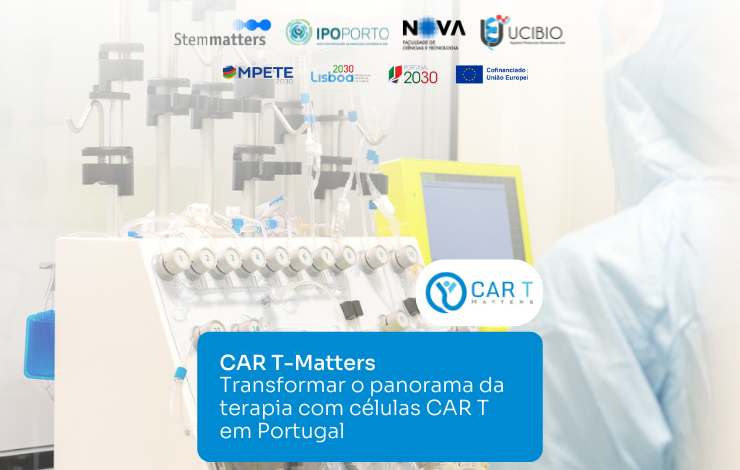06-06-2025

A Portuguese consortium led by the company Stemmatters, in partnership with the Portuguese Oncology Institute of Porto (IPO Porto) and the UCIBIO research unit at the Faculty of Sciences and Technology of NOVA University Lisbon (UCIBIO NOVA FCT), will join efforts to develop innovative CAR T cell therapies for cancer treatment in Portugal. The consortium aims to develop and establish, for the first time, national capacity to produce this type of personalized immunotherapy, thereby fostering the clinical development of new therapeutic solutions in the country.
CAR T cell therapies involve reprogramming T lymphocytes (immune system cells from the patient) to specifically recognize and attack cancer cells. This advanced form of immunotherapy has shown unprecedented success rates in certain blood cancers. However, access to these therapies in Portugal faces significant logistical and economic challenges, as the country currently lacks the ability to develop or manufacture them locally.
It was with this goal in mind that the consortium partners came together around the project “CAR T-Matters – Transforming the CAR T cell therapy landscape in Portugal”, which was selected for competitive funding by the COMPETE 2030 program, managed by the National Innovation Agency (ANI).
Currently, Portuguese patients eligible for CAR T therapies depend entirely on production centers abroad. The patient’s T cells are collected in a hospital in Portugal and sent to specialized laboratories overseas (in Europe or the U.S.), where they are genetically modified and expanded; the resulting therapy is then shipped back to be administered to the patient. This complex and lengthy process represents a major logistical burden and high costs. The IPO Porto has played a central and pioneering role in implementing and developing CAR T cell therapy in Portugal. Since 2019, IPO Porto has treated more than 100 patients with this innovative approach, mainly in cases of hematologic cancers such as lymphomas, leukemias, and multiple myeloma, both in clinical practice and in clinical trials.
"Developing the conditions to produce these cells will enable Portugal to offer more patients access to this innovative technology. It will attract more academic and industry-led clinical trials, democratizing access and reducing the cost of this therapy, which has brought significant benefits to cancer patients," says Júlio Oliveira, oncologist and president of IPO Porto.
The CAR T-Matters project aims to change this paradigm by establishing a national integrated structure for the development, production, and clinical translation of CAR T cell therapies. The main goal is to create an integrated ecosystem that reduces dependence on international infrastructures and accelerates the clinical translation of this type of therapy. To achieve this vision, the consortium will carry out complementary activities in the scientific, clinical, and industrial domains, leveraging the unique strengths of each partner.
On the scientific side, the UCIBIO team (along with members from the LAQV laboratory at NOVA FCT) will use advanced techniques in cheminformatics, artificial intelligence, and expertise in immunology and glycobiology to identify molecules capable of enhancing CAR T cell efficacy against tumors.
"We will explore thousands of molecules using machine learning algorithms to find the most promising ones to boost the anti-tumor capacity of CAR T cells. This enables us to model innovative therapeutic targets that go beyond traditional approaches," explains Paula Videira, professor and researcher at NOVA FCT. This integrated approach will improve therapeutic strategies, grounded in cancer biology and computational tools, to establish more effective and safer CAR T treatments.
In parallel, on the industrial front, Stemmatters will be responsible for implementing the manufacturing capacity for these cell therapies in line with regulatory and compliance standards. The company will develop production and quality control processes for CAR T cells using Quality-by-Design (QbD) methodologies and risk management strategies. These approaches aim to ensure that locally produced CAR T cells meet regulatory and safety requirements for future clinical use. In close collaboration with IPO Porto, logistical and clinical protocols will also be established to ensure the efficient distribution of these therapies to hospitals once they are ready.
"We aim to establish an integrated development and clinical translation chain for cellular immunotherapies, capable of supporting therapeutic innovation in Portugal," summarizes Rui Sousa, co-founder and CEO of Stemmatters and coordinator of the CAR T-Matters project.
"This is an important step toward national capacity building in the field of immunotherapies, as it brings together complementary resources and expertise to accelerate the development of immunotherapies and establish critical conditions for their production in Portugal," he concludes.
In the media
Consórcio português quer produzir terapias inovadoras com células CAR-T, Observador
Consórcio português quer produzir terapias inovadoras com células CAR-T para responder ao cancro, Correio da Manhã